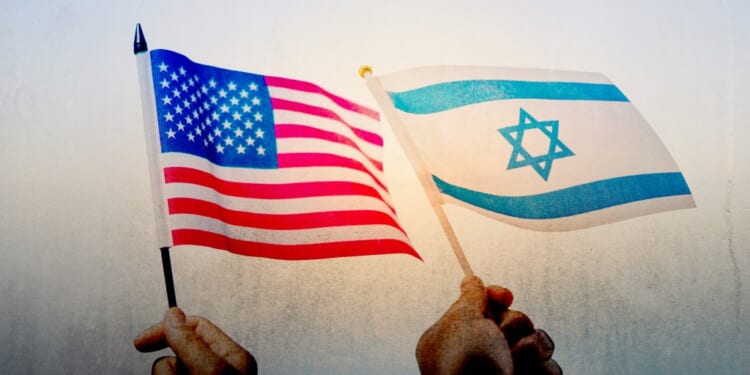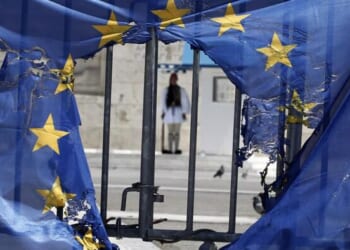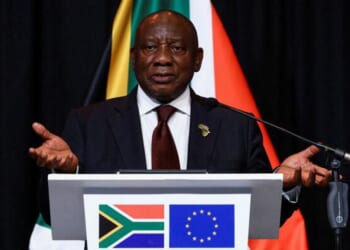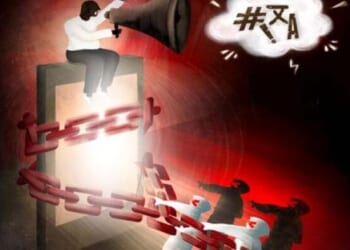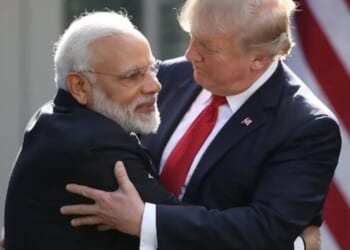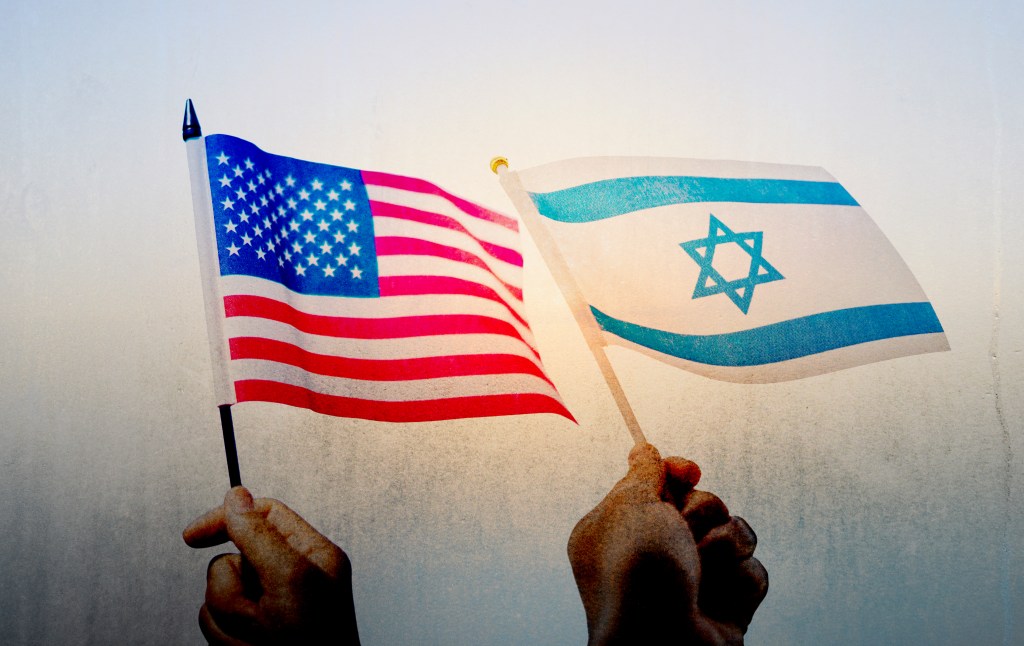
The political scientist Shadi Hamid has a problem: Despite everything, he still loves America. He’s deeply concerned by the presidency of Donald Trump, infuriated by bipartisan support for Israel, dispirited by what he sees as the nation’s endemic hypocrisy, horrified by its moral compromises, and perplexed by its self-doubt.
But the heart wants what it wants, and Hamid’s heart wants these United States. “I love America. If America is ‘almost a religion,’ then, well, it’s one I believe in,” Hamid writes in his new book, The Case for American Power.
These sentiments are not new coming from Hamid. But he does seem surprised that he still feels this way, given all his frustrations. “I continue to question my own belief in American power,” he writes. “Have I overshot the mark? Has my faith in America been too uncritical? This is one of the reasons I felt compelled to write this book: to think through a kind of compromise position that I—and hopefully some of you—can come to terms with.”
What most threatens Hamid’s faith in America is the war in Gaza. As he recently put it on X: The book “is an attempt to reckon with the tragedy of Gaza and whether it means we have to give up hope in America.”
Gaza animates Hamid’s anxiety. And while it gives the book its purpose, it’s also the cause of the book’s unevenness. In one moment, Hamid will calmly deploy scholarly rigor to dispense with anti-Western hokum; in another, he’ll passionately advance the wild claims of Hamas-controlled agencies in Gaza and lament that his faith in American power is shared by “Israel firsters.”
Still, none of this prevents Hamid from offering a clear and concise defense of America at a time when plenty of people need to hear it.
Hamid’s chapter on decline, for example, chides his fellow liberals for their cynicism, warning that their “tendency toward self-contempt is disproportionately concentrated among people of privilege, particularly left-leaning elites, young upwardly mobile progressives, and those who helm mainstream institutions. Remarkably, in 2023 [when Democrats held the White House], 60 percent of Republicans said that they were ‘extremely proud’ to be an American—but only 29 percent of Democrats were willing to say the same. In 2019, during the first Trump administration, the numbers were even more striking, with 76 percent of Republicans saying they were extremely proud compared with only 22 percent of Democrats—a massive gap of 54 percent.”
That trend is unlikely to reverse itself: Younger Democrats are less proud of America, and Hamid sees a correlation between national self-contempt and higher levels of educational attainment, creating a self-sustaining market for “oikophobia,” or the hatred of one’s own homeland. Hamid demonstrates how declinists have made almost a fetish of American collapse, while doomsaying pundits capitalize on the public’s “negativity bias” and the simple fact that “[p]eople fear loss more than they appreciate gains.”
Hamid rejects all such performative despondence. As he ably demonstrates in the book, democracies are stronger than they look and autocracies are weaker than they seem. Hamid cites the Varieties of Democracy project, which puts the share of democracies globally at just shy of 50 percent, up from less than 10 percent in 1945. “As these numbers suggest, democracies, once established, don’t often revert to autocracy. But once established, many of the world’s autocracies do—and did—collapse,” Hamid writes.
Autocracy, meanwhile, sows the seeds of its own discontent. Authoritarian powers like China depend on “performance legitimacy”: Citizens must believe that they are benefiting materially from a regime that suppresses their political and economic liberty. China therefore relies on economic growth. Yet even when growth numbers are high, those benefits are unevenly distributed. Plus, can the state’s official numbers even be trusted? The jobless cannot be convinced that they are employed, after all.
Further, Hamid quotes Chinese-Canadian political scientist Yuchao Zhu making another key point: “Since performance legitimacy is obviously intended to retain legitimacy which is perceived as already obtained, governance success does not necessarily provide the authority with a new justification of power.”
And there are moral and spiritual dimensions to self-governance that cannot be measured in dollars earned and roads paved. Democracy “is the only system of government aligned with our nature,” Hamid asserts. The freedom we enjoy under democracy’s umbrella “is a crucial part of what it means to be human. Under dictatorship, then, we are made less human. We are not who we are meant to be.” Not even China can “transcend” this problem.
So far it doesn’t sound like much of a contest, then. If someone’s going to have power, it might as well be the United States, right? What kinds of problems could American democracy face that would put U.S. global leadership in doubt?
The main answer from Hamid’s perspective: Gaza. Hamid finds America’s support for Israel’s defensive war against Hamas to be a world-historical moment of failure.
America’s actions during the Gaza war represent “a breaking point,” a “betrayal,” “a moral stain” in which the United States is “directly implicated,” Hamid writes. Because of that complicity, “Americans are no longer, if they ever were, in a position to lecture the rest of the world on human rights, international law, or the protection of civilians.”
The problem for Hamid is that he does not take the time to make the case for this dramatic reading of events. Perhaps he didn’t want the divisive war to cannibalize the book. But it’s jarring: Everything Hamid says about Gaza—which, again, is the reason he is writing this book—is assertion. The certainty with which he writes suggests he believes readers already agree with him that the U.S. should have intervened to stop Israel almost immediately after its military began responding to Hamas’ atrocities on October 7.
To buttress his case, Hamid cites a December 2023 report by the Washington Post claiming that the destruction in Gaza had reached a scale unprecedented in the 21st century. But two years later, the headlines coinciding with his book’s release paint a different picture. An analysis of Hamas’ own numbers shows a nearly 1-to-1 ratio of civilians to combatants killed, which would mean the Israeli military achieved unprecedented success in protecting civilians in an urban warfare environment. In September, data released by the Palestinian Authority and used by aid groups like UNICEF in their food security projections showed that, contrary to assertions by international agencies over the summer, the malnutrition rate in Gaza stayed below the threshold for declaring famine conditions.
Similarly, contemporary reports paint a concerning picture about the accuracy of wartime coverage from and about Gaza. Two BBC executives have just resigned after an investigation into their station’s scandalous coverage of the war. According to a report by the Telegraph, BBC Arabic has had to issue two corrections per week on Gaza stories “found to be biased, inaccurate or misleading” since October 7, 2023.
Still, there is no doubt that Gaza has experienced destruction and tragedy in the past two years. But what finally brought a tentative peace was an American negotiating team that did the opposite of what Hamid wanted them to.
Hamid proposed that the U.S. withhold military supplies from Israel, a move that would have prolonged the war and increased the death toll on both sides by removing Hamas’ incentive to agree to a ceasefire without stopping Israel’s operations in Gaza. Instead, the Trump administration put pressure on Hamas and its patrons. Hamid also denounced decades of American alliance-building with Arab police states, and while he is no doubt correct in many of his criticisms of these countries’ repressive governance, those relationships enabled Washington to squeeze Hamas’s support and end the war.
Which is to say, Hamid isn’t wrong that America can get results by throwing its weight around. It’s just that in the Middle East, he wants U.S. intervention to come at the expense of our allies and at the expense of the multilateralism that has sparked a wave of peace agreements in the region.
This is the grand irony of The Case for American Power. Hamid says Gaza will, for some, “stand as the strongest objection to the arguments in this book.” But in reality, America’s commitment to defeating Hamas actually reinforces his point. Hamid is right to believe in American power after all.

